|
|
|
Sort Order |
|
|
|
Items / Page
|
|
|
|
|
|
|
| Srl | Item |
| 1 |
ID:
165847
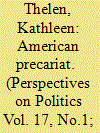

|
|
|
|
|
| Summary/Abstract |
The address situates the rise of “gig” work in the context of a much longer-term trend toward more precarious forms of employment. It explores the forces that are driving these developments and discusses the problems they pose at both the individual level and the national level. By situating the United States in a comparative perspective, it identifies the structural factors that exacerbate the problem of precarity and intensify its effects in the American political economy.
|
|
|
|
|
|
|
|
|
|
|
|
|
|
|
|
| 2 |
ID:
168193
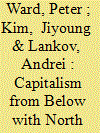

|
|
|
|
|
| Summary/Abstract |
Post-socialist transformation has been studied extensively in Eastern Europe, the former Soviet Union, and other states in Asia. This article will examine the North Korean experience and suggests how North Korea's post-socialist experience can be positioned within the broader picture of post-socialism. In this article we focus on the following three areas: the state sector, capitalist class formation and capital accumulation, and the role of foreign investment. We rely on a reading of North Korean laws and North Korean official publications, previous survey work involving firms dealing with North Korea in the past and present, as well as official North Korean census data to offer as full a picture as is possible.
|
|
|
|
|
|
|
|
|
|
|
|
|
|
|
|
| 3 |
ID:
156287
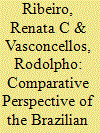

|
|
|
|
|
| Summary/Abstract |
In the early 1960s, India and Brazil started developing space capabilities covering three major complementary areas: (1) satellites; (2) launch vehicles; and (3) ground systems. More than 50 years later, India is among the most active and successful spacefaring countries and is developing cost-effective space technologies. On the other hand, Brazil still does not possess a launch system and has put into orbit only small and non-commercial satellites, several of them built with Chinese cooperation and launched on Chinese launch vehicles. The goal of this article is to compare Brazilian and Indian space programs, which present different levels of accomplishments. This analysis contains three elements. The first part discusses the two space programs’ evolutions and their contemporary features. The second part compares the space programs’ models from two observation variables: (1) the state administrative organization; and (2) international cooperation in the space sector. Finally, the third part of the article compares the strengths and challenges of each program, highlighting that an international partnership between Brazil and India in space opens a window of opportunity for Brazil to take part in a much wider range of projects than is possible if funded alone.
|
|
|
|
|
|
|
|
|
|
|
|
|
|
|
|
| 4 |
ID:
148395
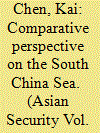

|
|
|
|
|
| Summary/Abstract |
The Asia-Pacific region, even the world, is increasingly focusing on the South China Sea, which is not only one of the most important waterways in the world but also a hot spot of competing claims to territorial sovereignty. The disputes in this region are not new. They can be categorized into two groups: the first concerning territorial sovereignty over islands or reefs, and the second the overlapping exclusive economic zones and continental shelf claims. Historically, the claimants follow the 1982 United Nations Convention on the Law of the Sea (UNCLOS).
|
|
|
|
|
|
|
|
|
|
|
|
|
|
|
|
| 5 |
ID:
132939
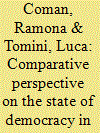

|
|
|
|
|
| Publication |
2014.
|
| Summary/Abstract |
The scholarship on Central and Eastern European politicsand societies is well established in the literature. Over the past two decades, scholars have addressed a variety of topics including the role of civil society in transition and democratic consolidation (Linz & Stepan 1996a, 1996b; P?ibá? & Young 1999; Pridham 2001; Pollack & Wielgohs 2004); the process of institution-building and the functioning of institutions (Karp 1994; Zielonka 2001; Malova & Haughton 2002); the development of political parties and their contribution to democracy (Kitschelt 1992; De Waele 1999; Lewis 2001, 2008; Hough 2005; Deegan-Krause & Haughton 2010; Burnell & Gerrits 2010); the role of external actors in the process of consolidation of democracy, and in particular the role of the EU and the enlargement process (Papadimitriou 2002; Dimitrova 2004; Schimmelfennig & Sedelmeier 2005; Vachudova 2005; Epstein & Sedelmeier 2009; Morlino & Sadurski 2010; O'Brennan 2011); populist parties (Mudde 2007; De Waele & Pacze?niak 2010; Pankowski 2011) and the ambiguous role of nationalism (Latawski 1994; Auer 2004); the problem of the rights of ethnic, linguistic, religious and national minorities (Taras 1998; Rechel 2009); the relationship between justice and politics (Anderson et al.2005; Coman & De Waele 2007; Coman 2009; Piana 2010); the construction of a market economy and the relationship between democracy and economic policies (Jeffries 1996; Stark & Bruszt 1998; Hasselman 2006; Myant & Drahokoupil 2010); political cultures (Pollack 2003; Klingemann 2008); the problems related to corruption (Smilov & Toplak 2007; Schmidt-Pfister & Moroff 2012); and the development of regionalisation and the role of local governments (Hughes et al.2004a, 2004b; Coulson & Campbell 2007).
|
|
|
|
|
|
|
|
|
|
|
|
|
|
|
|
| 6 |
ID:
089345
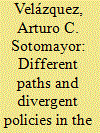

|
|
|
|
|
| Publication |
2009.
|
| Summary/Abstract |
How can we explain foreign policy variation among UN member states? Brazil and Mexico are the most likely cases for international primacy in the UN system, given their territorial dimension, demographic tendencies, economic importance, geopolitical location and relative weight in Latin America. Yet, despite their structural similarities, their policies and behaviour in the UN system have varied, both in terms of engagement with the Security Council and commitment regarding peacekeeping. By comparing two of Latin America's most influential countries, this study identifies the underlying conditions and mechanisms that explain their differences in behaviour and policy in the UN. In particular, this article analyses and contrasts how geopolitics and civil-military relations in Brazil and Mexico affect their incentives to participate in international organizations and their overall international commitment to peace.
|
|
|
|
|
|
|
|
|
|
|
|
|
|
|
|
| 7 |
ID:
133238
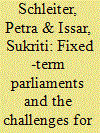

|
|
|
|
|
| Publication |
2014.
|
| Summary/Abstract |
The Fixed-term Parliaments Act significantly reduces the powers of the Prime Minister to manage the risk of government termination and to time elections to his or her party's advantage. In this paper we ask how the Act is likely to change the way in which governments terminate, their durability and opportunities for planning in government and departments. In answering these questions we draw on quantitative comparative evidence from other European countries that operate with fixed-term parliaments. Our analysis suggests that fixing the parliamentary term can be expected to convert some opportunistically called elections into regular elections and to stabilise governments toward the end of the parliamentary term. But the Act is also likely to have unanticipated consequences in increasing governments' vulnerability to failure before they reach the final sessions of Parliament. We explore these unanticipated consequences and outline their implications for governing style and Civil Service planning
|
|
|
|
|
|
|
|
|
|
|
|
|
|
|
|
| 8 |
ID:
175465
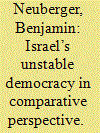

|
|
|
|
|
| Summary/Abstract |
This article raises the question whether Israel is a stable or an unstable democracy. Its conclusion – based on a theoretical analysis that relates to variables such as the legitimacy of the regime, its effectiveness, the degree of general consensus it enjoys in society at large and amongst the elites, its party system and polarisation, its socioeconomic structure, the centrality of security issues, its constitutional structure and electoral system, and the international environment – is that it is unstable. The article’s approach is comparative and relates Israel to historical case studies, like post-World War I Weimar Germany, Italy, Britain and the US; post-World War II Germany, France, Italy, and Spain; the newly democratic states of Eastern Europe; and the Third World.
|
|
|
|
|
|
|
|
|
|
|
|
|
|
|
|
| 9 |
ID:
146252


|
|
|
|
|
| Summary/Abstract |
Many classic studies of leadership focus on strong leadership in the singular. This essay focuses on effective leaderships in the plural. Some of the greatest failures of democratic transitions (Egypt, Syria, Libya) have multiple but highly conflictual leaderships. However, a key lesson in democratization theory is that successful democratic transitions often involve the formation of a powerful coalition, within the opposition, of one-time enemies. This was accomplished in Chile, Spain, and Indonesia. In greater detail, this essay examines Tunisia, the sole reasonably successful democratic transition of the Arab Spring. In all four cases, religious tensions had once figured prominently, yet were safely transcended by the actions of multiple leaders via mutual ideological and religious accommodations, negotiated socioeconomic pacts, and unprecedented political cooperation. A multiplicity of cooperating leaders, rather than a single “strong leader,” produced effective democratic leadership in Tunisia, Indonesia, Spain, and Chile.
|
|
|
|
|
|
|
|
|
|
|
|
|
|
|
|
| 10 |
ID:
152604
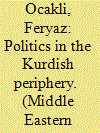

|
|
|
|
|
| Summary/Abstract |
Despite the return to violence and state repression in the Kurdish conflict, the ruling Adalet ve Kalkınma Partisi (Justice and Development Party – AKP) has remained the only alternative to the Kurdish National Movement (KNM) for Turkey's Kurdish citizens. What local-level strategies did the AKP employ in Kurdish areas to reinforce its national-level appeal to Islamic values? Under what conditions did local vote-seeking strategies help the AKP to overcome its pro-Kurdish rivals at the ballot box? This article examines the politics of local coalition building in the periphery of the Kurdish landscape – Bingöl and Muş. Despite their many similarities, the two cities voted for different political parties in national elections. This article examines how the AKP's local party organizations interacted with local authority structures, recruited influential local elites, and pursued new voters. The vitality of clan networks in parts of Bingöl enabled the AKP to build a reliable local coalition. The gradual weakening of clan networks in Muş and their permeation by the KNM prevented a similar coalition. Instead, the parties of the KNM were able to take advantage of divided clan networks to win national electoral contests in the province.
|
|
|
|
|
|
|
|
|
|
|
|
|
|
|
|
| 11 |
ID:
105275
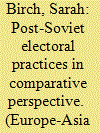

|
|
|
| 12 |
ID:
151723
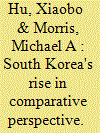

|
|
|
| 13 |
ID:
175543
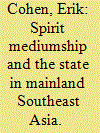

|
|
|
|
|
| Summary/Abstract |
This comparative study examines the complex, changing configurations of the relationships between the state and mediumship cults, under different regimes and histories in three Southeast Asian states and China. Spirit mediums are endowed with charismatic authority, owing to their access to the supernatural sphere, which stands in implicit tension with the authority of the state. This tension underlies state–mediumship relationships in Southeast Asia, but leads to diverse dynamics, according to the place of religion in each state. In the atheist, communist/post-communist states (China and Vietnam) mediumship is primarily approached as a political issue; in Buddhist Thailand as a religious issue, and in multicultural Malaysia, where Islam is the official religion, as a legal issue. Tensions prevail particularly in the communist/post-communist states, where there has been a resurgence of mediumship cults, even as these are officially proscribed as ‘superstitions’. In Thailand tensions have been ameliorated by a gradual amalgamation of the cults and popular Buddhism, while in Malaysia tensions are prevented by controls over religious practices. Further research on the relatively neglected issue of the relationship between the state and mediumship cults in the emergent regions of the world is suggested.
|
|
|
|
|
|
|
|
|
|
|
|
|
|
|
|
| 14 |
ID:
131821
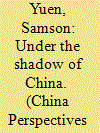

|
|
|
|
|
|
|
|